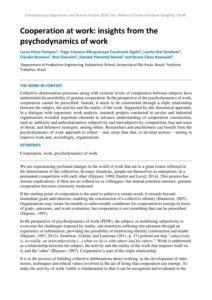| Document | Author Lucca Pérez Pompeu, Tiago Fonseca Albuquerque Cavalcanti Sigahi, Laerte Idal Sznelwar, Cláudio Brunoro, Ruri Giannini, Daniele Pimentel Maciel and Bruno César Kawasaki |
| Abstract Collective deterioration processes along with extreme levels of competition between subjects have undermined the possibility of genuine cooperation. In the perspective of the psychodynamics of work, cooperation cannot be prescribed: instead, it needs to be constructed through a triple relationship between the subject, the activity and the reality of the work. Supported by this theoretical approach, in a dialogue with ergonomic work analysis, research projects conducted in service and industrial organisations revealed important elements to advance understanding of cooperation construction, such as: authority and authoritarianism; subjectivity and intersubjectivity; competition; fear and sense of threat; and defensive strategies, among others. Researchers and practitioners can benefit from the psychodynamics of work approach to reflect – and, more than that, to develop actions – aiming to improve work and, accordingly, organisations. |

